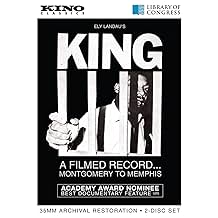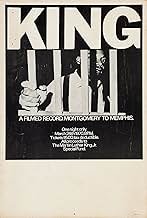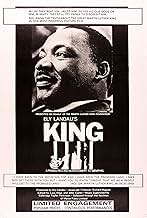King: de Montgomery à Memphis
Titre original : King: A Filmed Record... Montgomery to Memphis
- 1969
- 3h 5min
NOTE IMDb
8,2/10
684
MA NOTE
Ce documentaire retrace la vie de Martin Luther King et de ses décennies d'activisme en faveur des droits civiques.Ce documentaire retrace la vie de Martin Luther King et de ses décennies d'activisme en faveur des droits civiques.Ce documentaire retrace la vie de Martin Luther King et de ses décennies d'activisme en faveur des droits civiques.
- Réalisation
- Scénario
- Casting principal
- Nommé pour 1 Oscar
- 1 victoire et 1 nomination au total
Martin Luther King
- Self
- (images d'archives)
Ralph Abernathy
- Self
- (images d'archives)
James Baldwin
- Self
- (images d'archives)
Tony Bennett
- Self
- (images d'archives)
Leonard Bernstein
- Self
- (images d'archives)
Marlon Brando
- Self
- (images d'archives)
H. Rap Brown
- Self
- (images d'archives)
Avis à la une
Compiled from newsreel footage and interspersed with celebrity commentary, this film has a heavy impact, showing Rev. King, not as a saint, but as a compassionate man of God with great goals for all people. The film quality is rather rough at times, and the racial slurs shouted are harsh, but the film is powerful. Recommended for those who seek an insight to the man behind the dream.
10greg-253
After watching 103 minute edited version (the only celeb commentary by Harry Belefonte), one has to wonder why this film isn't more available to the general public. It is by far, one of the best documentary efforts to chronicle Martin Luther King Jr. as he helped push the civil rights movement forward into the public consciousness.
What makes this film special (in its condensed version) is the plainly laid out - but thoughtfully edited - chronology of Dr. King's various actions, speeches - and the public response. Other than Belafonte's opening statement, the film has no narration - which gives it an urgency. This is punctuated by King's powerful oratory (including the entire I Have A Dream speech...and segments of many others), along with footage of demonstrations, marches and material that is often hard to watch due to the racially charged violence.
Still, it is a potent reminder of our history - and should be seen by all.
What makes this film special (in its condensed version) is the plainly laid out - but thoughtfully edited - chronology of Dr. King's various actions, speeches - and the public response. Other than Belafonte's opening statement, the film has no narration - which gives it an urgency. This is punctuated by King's powerful oratory (including the entire I Have A Dream speech...and segments of many others), along with footage of demonstrations, marches and material that is often hard to watch due to the racially charged violence.
Still, it is a potent reminder of our history - and should be seen by all.
We just passed what would've been Martin Luther King, Jr.'s 90th birthday, so I decided to watch this documentary. You've heard about Martin Luther King, Jr. You've probably seen footage of some of his speeches. But to truly understand him, you have to see Sidney Lumet's Academy Award-nominated "King: A Filmed Record... Montgomery to Memphis". Originally screened as a one-night event, it's now available for home viewing. The documentary consists of footage of King starting with the bus boycott in Montgomery until his funeral, emphasizing how he called upon the United States to live up to the ideals that it professed. Whether addressing racial and class issues or coming out against the Vietnam War, he was on the front lines of justice every step of the way.
The documentary includes footage of people (Harry Belafonte, Ruby Dee, Paul Newman, Joanne Woodward, etc) quoting King. It emphasizes the diversity of people who stood on the side of morality. In an era when we see racism coming back to the fore - pushed by the current demagogue-in-chief - it's more important than ever to understand King's legacy. Definitely see this documentary.
The documentary includes footage of people (Harry Belafonte, Ruby Dee, Paul Newman, Joanne Woodward, etc) quoting King. It emphasizes the diversity of people who stood on the side of morality. In an era when we see racism coming back to the fore - pushed by the current demagogue-in-chief - it's more important than ever to understand King's legacy. Definitely see this documentary.
I'm not sure this is an actual documentary. It has no editorial or narrative structure per se, what it presents us with is as comprehensive a chronology of Dr. Martin Luther King as it is possible to get. From his humble beginnings in an Alabama ridden with bigotry and strife, through to his assassination in 1968, this uses a phenomenal amount of archive research to illustrate the power of his oratory. His speeches are powerful and emotional, but they never come across as angry or provocative of violence. His strength of character and purpose in the face of a long-established racial belligerence is really quite well captured as the film includes the large scale "I Have a Dream" set-pieces to far more intimate and poignant comments to smaller groups, churches or even just to his aides and friends as he travels the length and breadth of the country extolling the virtues of freedom for all. That all isn't just for folks of colour, but those being persecuted for their religious beliefs too, or being disadvantaged because of their sex or social status. It's hard to imagine who might actually watch all of this now, it is a long haul, but it goes quite some way to testifying just how effective oratory can be when delivered confidently and proudly to an audience eager to engage. There is enough annotation to help advise on the locations and timelines, and there are a few - slightly unnecessary, I felt - staged readings from the likes of Charlton Heston and James Earl Jones to help, as does the latter archive footage, demonstrate that his optimism wasn't just inspiring those African Americans, but plenty from the descendants of it's European immigrant population too. It doesn't attempt to analyse the man, his motives or his personal life but I don't think that was anyone's plan. It's a vehicle for his passion, and it works powerfully.
It's a documentary of Martin Luther King, Jr.'s life from 1955 to his death in 1968. Except for his first speech at the beginning of the Montgomery Bus Boycott, it is primarily news footage and coverage of his best-known activities during those years and the local circumstances that brought about those activities. The Montgomery speech is audio only. That is both its strength and limitation.
This film is one of the few places you can still see and hear the entirety of King's "I Have a Dream" speech of 1963. There are numerous other memorable speeches; seeing him deliver them visually dramatically increases the impact. It is so focused on King, however, that you don't get an overview of the Civil Rights movement, especially those parts in which he had a limited profile, such as the Freedom Rides in 1961.
There is nothing about King's personal life or the work of his associates. To get better context, you need the background of a good biography like Jonathan Eig's "King: a Life." But to be bathed in M. L. King's oratory, this three-hour film is the place to go.
Some celebrities narrate brief segments intermittently. They are a distraction and add nothing.
This film is one of the few places you can still see and hear the entirety of King's "I Have a Dream" speech of 1963. There are numerous other memorable speeches; seeing him deliver them visually dramatically increases the impact. It is so focused on King, however, that you don't get an overview of the Civil Rights movement, especially those parts in which he had a limited profile, such as the Freedom Rides in 1961.
There is nothing about King's personal life or the work of his associates. To get better context, you need the background of a good biography like Jonathan Eig's "King: a Life." But to be bathed in M. L. King's oratory, this three-hour film is the place to go.
Some celebrities narrate brief segments intermittently. They are a distraction and add nothing.
Le saviez-vous
- AnecdotesThis film originally was shown at theaters as a "one-time-only" event on 24 March 1970 and ran 3 hours and 5 minutes. The proceeds from the $5 admission price were donated to the Dr. Martin Luther King Jr. Special Fund. It was later shown on US television, unedited and with limited interruption.
- Versions alternativesA second version, edited down to 103 minutes, was released onto videotape. It is missing the celebrety narratives and an opening montage of clips of militant black leaders with violent rhetoric contrasting to clips of Dr. King's non-violent messages, but includes the original introduction by Harry Belefonte, and consists entirely of newsreel footage.
- ConnexionsFeatured in C'est assez noir pour vous?!? (2022)
Meilleurs choix
Connectez-vous pour évaluer et suivre la liste de favoris afin de recevoir des recommandations personnalisées
Détails
- Date de sortie
- Pays d’origine
- Langue
- Aussi connu sous le nom de
- King: A Filmed Record... Montgomery to Memphis
- Lieux de tournage
- Société de production
- Voir plus de crédits d'entreprise sur IMDbPro
- Durée
- 3h 5min(185 min)
- Couleur
- Mixage
- Rapport de forme
- 1.37 : 1
Contribuer à cette page
Suggérer une modification ou ajouter du contenu manquant




























